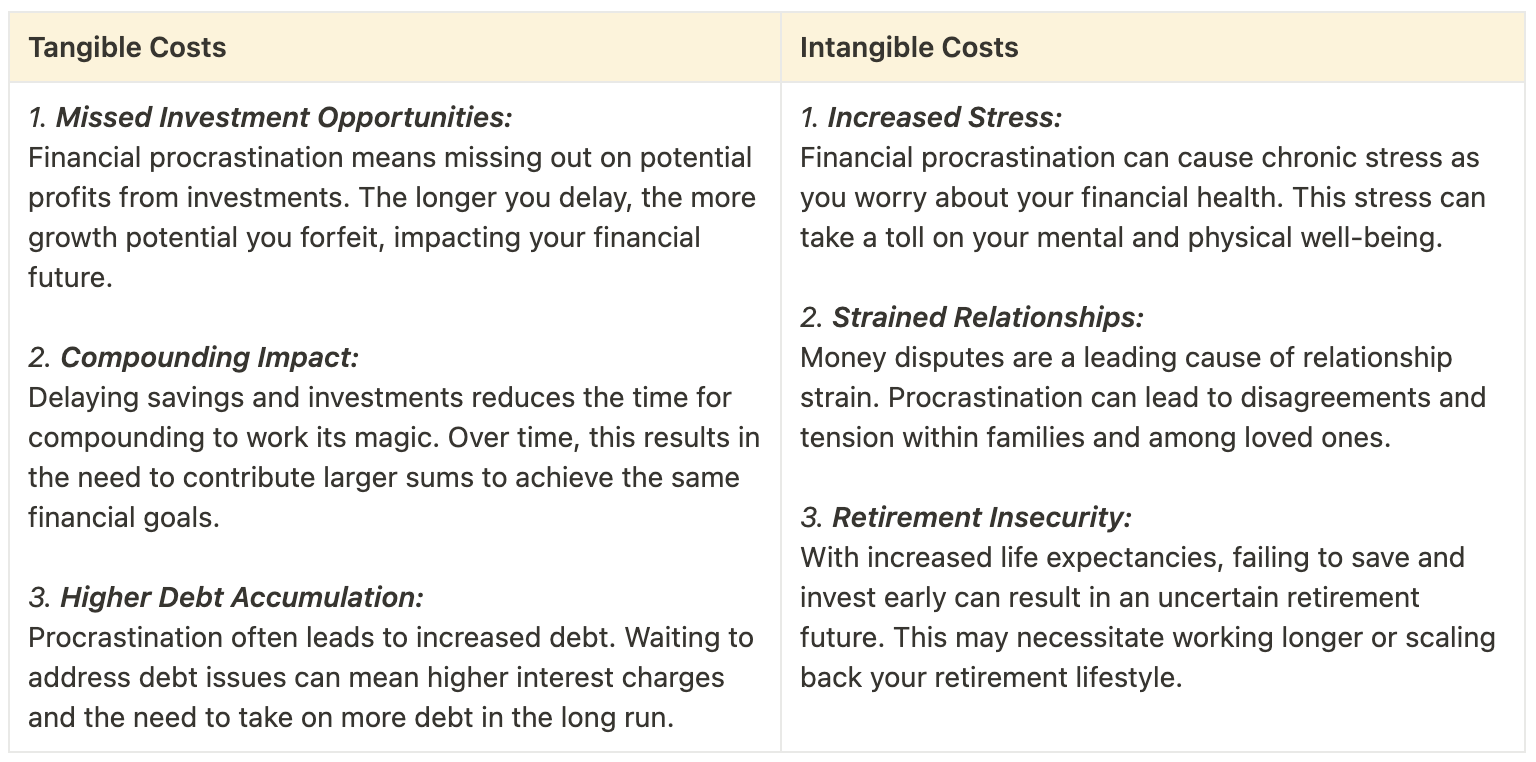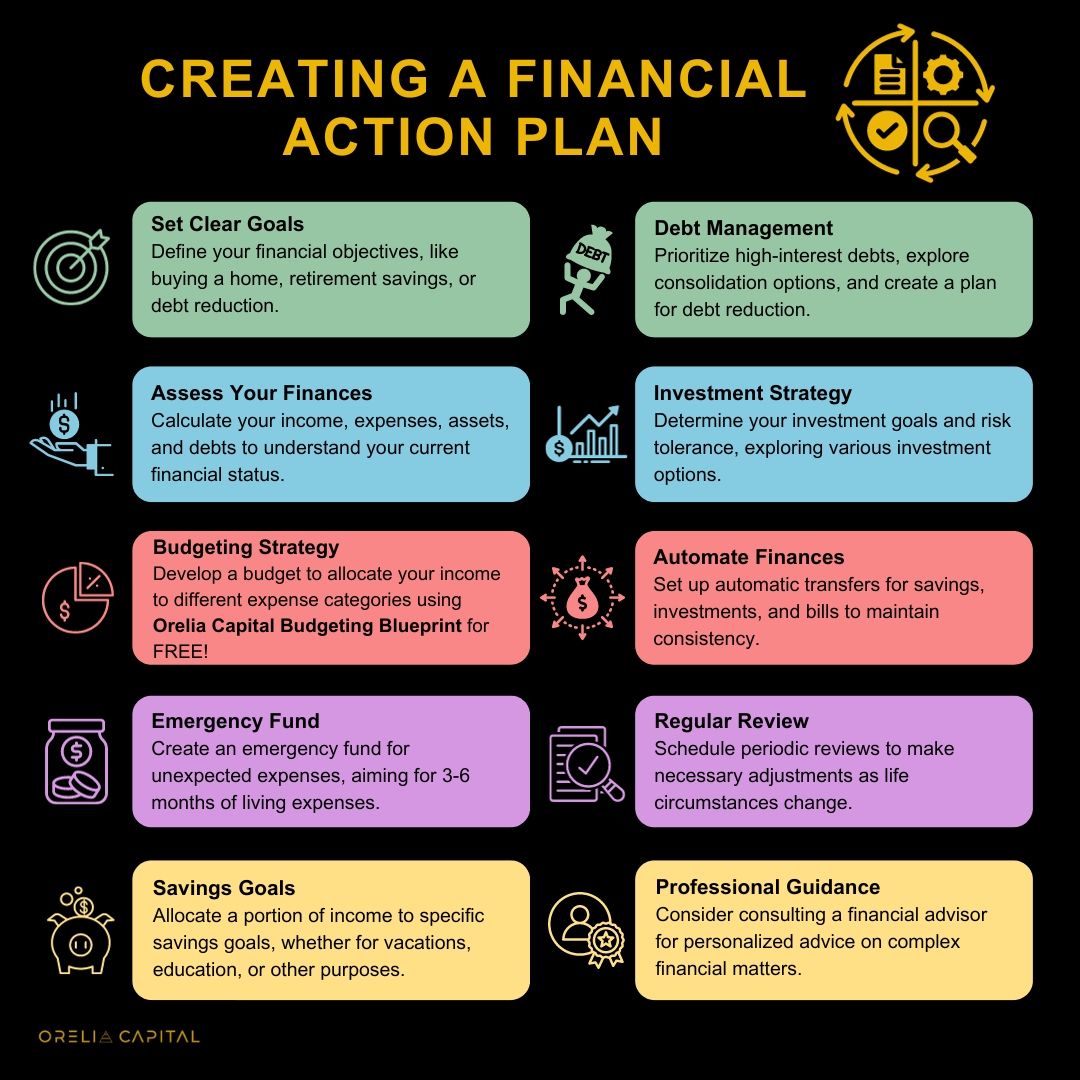Understanding the Psychology of Financial Procrastination

The Root Causes of Financial Procrastination:
Financial procrastination often stems from deep-seated psychological triggers. It's a way to avoid the anxiety and stress that financial decision-making can bring, creating a cycle of avoidance.
Emotional Hurdles:
Powerful emotions frequently act as roadblocks to financial action. Fear of making wrong choices, guilt about past financial missteps, and feeling overwhelmed by financial responsibilities can all be significant emotional barriers.
Cognitive Barriers:
Beyond emotions, cognitive factors can also be stumbling blocks to financial progress. A lack of financial knowledge and misconceptions about financial concepts can hinder decision-making and lead to procrastination.
Temporal Discounting:
People frequently undervalue the long-term benefits of financial decisions and prioritize immediate gratification. This tendency, known as "temporal discounting," can lead to procrastination when long-term goals seem less appealing.
Overestimating Future Willpower:
Overestimating one's future willpower and self-discipline is a common pitfall. This can lead to procrastination, as individuals assume they'll have the motivation to address financial matters later.
Psychological Biases in Play:
Cognitive biases, such as confirmation bias and loss aversion, can influence financial decision-making. These biases can lead to irrational choices and, consequently, fuel procrastination.
The Cost of Financial Procrastination

Setting SMART Financial Goals
- Setting financial goals gives you direction and purpose. It helps you identify what's important to you and what you want to achieve.
- Start by considering your long-term goals, such as buying a house, starting a business, or retiring early. Then, break them down into smaller, achievable goals.
- Create SMART goals that are - Specific, Measurable, Achievable, Relevant and Time-bound. This will help you track your progress and stay motivated.

Overcoming Common Financial Procrastination Traps:
1. Fear of the Unknown:
- Tip 1: Knowledge is Power: Knowing your financial situation can significantly reduce anxiety. Begin by educating yourself about fundamental financial concepts like budgeting, saving, and investing.
- Tip 2: Seek Guidance: Do not hesitate to seek advice from financial experts or mentors. A consultation with a financial advisor can demystify complex financial matters and help build your confidence.
2. Lack of Knowledge:
- Tip 1: Invest in Learning: Consider taking online courses, reading financial literature, or participating in workshops to enhance your financial literacy. Start with the basics and progressively advance.
- Tip 2: Learn from Others: Engage in conversations with financially knowledgeable friends and family members. Their experiences and advice can be invaluable in your learning journey.
3. Overwhelm:
- Tip 1: Divide and Conquer: Break down your financial goals into smaller, more manageable tasks. For instance, if you aim to save for a down payment on a house, create a step-by-step plan that outlines how much you need to save each month.
- Tip 2: Set Realistic Expectations: Understand that financial progress takes time. Avoid pressuring yourself to achieve all your goals overnight. Cultivate patience and celebrate minor milestones along the way.
4. Procrastination Due to Perfectionism:
- Tip 1: Embrace Imperfection: Realize that financial decisions need not be flawless. It's okay to make mistakes. Focus on making progress rather than waiting for the perfect opportunity or strategy.
- Tip 2: Start Now: Take the first step, even if it seems small. Open that savings account, invest, or create a basic budget. The act of beginning can often break the procrastination cycle.
5. Lack of Accountability:
- Tip 1: Share Your Goals: Share your financial goals with a trusted friend or family member. Knowing that someone knows your objectives can provide a sense of responsibility.
- Tip 2: Automate Your Finances: Arrange for automatic transfers to savings or investments on payday. This ensures that a portion of your income is allocated towards your financial goals without requiring constant motivation.

Financial procrastination is a common hurdle, but it's not unconquerable. By understanding its psychological roots and recognizing its costs, you can take concrete steps to overcome it. Setting SMART goals, creating a financial action plan, and using the right tools and resources are critical. Whether it's budgeting apps, financial advisors, investment platforms, or educational resources, these are your allies in the battle against procrastination. Start now, and your financial future will be brighter.
Your dreams are within reach, and your peace of mind is worth the effort.
Don't wait; begin your journey to financial success today!

We hope you enjoyed this edition of our newsletter. If you found it helpful, please consider sharing it with others who might benefit from this information.
At Orelia Capital, we believe that feedback is a gift. Your feedback can help us improve our content and provide more value to our readers.





